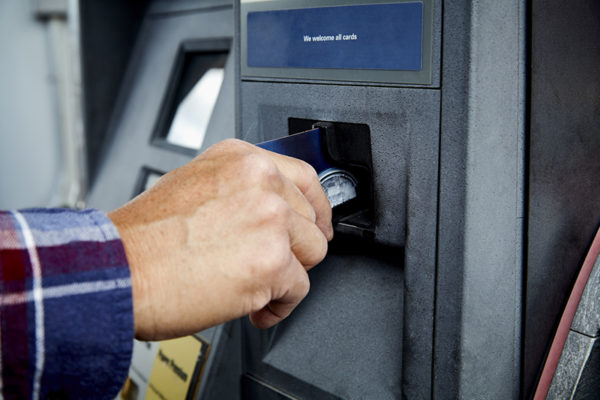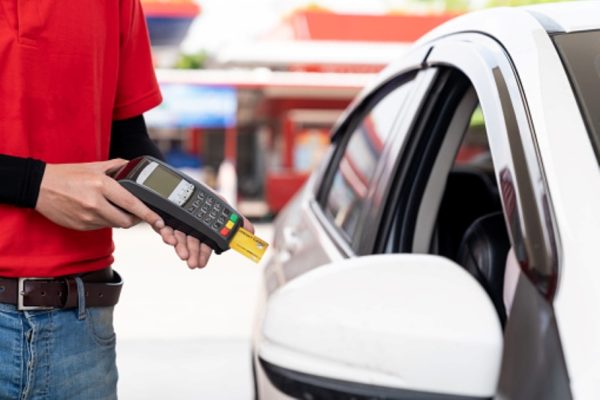If you’re looking for a way to make it easier for your team to pay for fuel and other expenses while they’re away from home base, an open loop fleet card is the solution.
In this article, we discuss how open loop fleet cards are different from many legacy gas cards, how your business can benefit from using an open loop fleet card, and how to choose the right open loop fleet card for your team.
Table of Contents
- What Is An Open Loop Fleet Card?
- Benefits Of An Open Loop Fleet Card
- Tips For Choosing The Best Open Loop Fleet Card
- Manage Your Fleet With A Smart Online Platform
What Is An Open Loop Fleet Card?

Before we discuss open loop fleet cards, let’s back up a step and examine regular fleet cards to better explain the difference between the two.
A fleet card (a.k.a. fuel card, business gas card, fleet gas card, and others) is a more secure way for drivers to pay for fuel while on the road.
Compared to cash and checks, this type of payment method gives you, the fleet manager, more control over what your vehicle operators spend money on.
One of the downsides to many legacy fleet cards like these is that drivers can only use them at certain locations. For example, your drivers may carry a fuel card issued by a certain company that is only good at one gas station chain.
Restrictions like this make it more difficult for your team to stick to their route and find the best fuel price when they need to fill up. Ultimately, then, that can lead to higher overall expenses for your fleet and lower profits for your business.
There is, however, a solution that offers the same secure way for drivers to fill up their commercial vehicles while on the road without the restrictions that legacy fleet cards typically have in place. That solution is an open loop fleet card.
A open loop fleet card acts just like a legacy fleet card — in that it’s a simple and secure way for your team to pay for fuel while on the road — but drivers can use it anywhere Visa (or other widely-accepted card network) is accepted.
An open loop fleet card all but eliminates the restrictions that come with legacy cards and makes it much easier for drivers to stick to the most efficient route and to find the lowest fuel price along the way.
Benefits Of An Open Loop Fleet Card

1) Universal Acceptance
As we touched on in the previous section, the biggest benefit of an open loop fleet card is the fact that your team can pay for fuel at any station that accepts Visa or other card network (which is pretty much everywhere).
The wider access to fuel that an open loop fleet card offers makes it much easier for drivers to find the stops along their planned driving path that offer the lowest-priced fuel and means they won’t have to go out of their way to try to save money.
Fewer detours saves precious time, cuts down on miles driven, and, ultimately, reduces what your business spends on fuel.
2) Reduced Driver Stress
Driving a work van, work truck, or semi truck in town or over the road is a stressful job.
An open loop card can help reduce that stress and make it easier for your team to focus on traveling from point A to point B safely.
When your drivers know that they don’t have to try to figure out where and when it’s most advantageous to fill up, they’ll be able to give more of their attention to piloting their vehicle and navigating the traffic around them.
3) Advanced Spending Controls

A top-of-the-line open loop fleet card will usually offer some type of advanced spending controls. These controls allow you to set rules for each card you issue to your commercial fleet drivers so that they spend less at the pump.
With some cards you can:
- Limit purchases by days of the week
- Limit purchases by time of day
- Establish pre-set spending limits per transaction
- Set spending based on vehicle location
- Approve or deny other types of spending such as parking and maintenance
All of this helps your business reduce costs and control fleet vehicle spending like never before.
4) Security
Some open loop fleet cards offer enhanced security to help stop theft, abuse, and fraud.
They do this by making it easy to track everything — usually through an online platform that provides real-time data — so that you can see where and when both a vehicle and the fuel card are being used.
Advanced fleet cards will also send you alerts — again through their online platform — about suspicious activity, such as:
- Transactions attempted outside the authorized purchase area
- Fill ups that exceed vehicle tank capacity
- Attempted non-fuel purchases
In some cases, you can even lock a card in one or two clicks to completely prevent it from being used.
5) Streamlined Receipts
One of the most difficult and time-consuming parts of monitoring and organizing a fleet is keeping track of and collating the various gas receipts from each driver.
Matching receipts with your records is a full-time job in itself. But, when you incorporate an open loop fleet card into your workflow, you can track everything online and in one place.
This saves you time while helping you control spending, free up storage space, reduce waste, and make your fleet management as streamlined as possible.
Choose the top-rated fleet card for your business

Tips For Choosing The Best Open Loop Fleet Card

1) Verify Acceptance Level
Many legacy card providers are closed loop systems, so if you want wider acceptance, be sure to opt for an open loop fleet card.
2) Check For Hidden Fees
Some fleet cards hide extra fees in their fine print. These hidden fees can really add up and all but eliminate any savings they may offer.
As you investigate the open loop fleet card that is right for your business, ask about hidden fees that might not be readily apparent. Watch out for add-ons such as out-of-network fees (i.e., when drivers purchase fuel at unapproved locations), per-gallon fees, and transaction fees.
Shop around for a card with clear terms of service, and, if you have any questions, be sure to talk to customer service about the chance of hidden fees showing up on your bill.
3) Earn Rebates And Rewards

Some of the best fleet cards make it easy to earn rebates and rewards on the regular purchases your drivers make — even fuel. Depending on the card you choose, you might earn a rebate on every gallon of fuel you purchase.
But those rebates may be limited to a certain period of time (e.g., the first three months after you start using the card), to a certain number of gallons (e.g., the first 200 gallons per statement period), or to a certain brand of fuel.
Some fleet cards also offer rewards such as:
- Referral incentives
- Discounts with partner businesses
- Sign-up bonuses
Savings like these can quickly add up, so it’s worth identifying the rebates, the rewards, and the limitations of each fleet card in which you’re interested.
4) Minimize Administration Fees
Whether you manage a fleet of five vehicles or 500 vehicles, every dollar counts. A fleet card with high administration fees can mean the difference between operating in the red and operating in the black.
These extra charges usually take the form of:
- High credit risk fees
- Higher late fees when you carry a high balance
- Electronic processing fees
- Check processing fees
- Phone-payment fees
Minimize unforeseen administration fees by selecting a card with fair, transparent, and straightforward terms.
5) Find Flexible Payment Terms
Another tip for choosing the right fleet card for your team is to find flexible payment terms that fit the way your business operates.
Look for payment terms that optimize company cash flow so that paying the statement doesn’t conflict with, or take away from, other essential company needs. And try to avoid a fleet card that locks you into a less-than-ideal billing schedule.
For example, one card may lock you into a 14-day payment schedule so that your business has to make a payment every two weeks while another card may lock you into a 7-day payment schedule so that your business has to make a payment every single week.
Operating without flexible payment terms puts your fleet operations behind the eight ball, so to speak, right from the get-go and makes it harder for your business to succeed.
Manage Your Fleet With A Smart Online Platform

Want to reap the benefits of an open loop fleet fuel card and manage your fleet better? Coast can help.
Coast provides real-time expense tracking and a powerful online management platform that puts your entire fleet in the palm of your hand and provides full visibility of every dollar spent.
With Coast, your business will enjoy:
- Easy manager access
- Advanced spending controls
- Visa acceptance
- Security alerts
- Data tracking and reporting
For more information and full terms and conditions, visit CoastPay.com.


